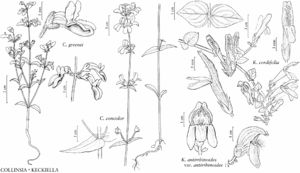Collinsia concolor
Erythea 3: 49. 1895.
Annuals 15–40 cm. Stems erect to ascending. Leaf blades narrowly oblong to widely lanceolate, margins entire, rarely serrate. Inflorescences finely hairy to shaggy, usually finely glandular; whorls 2–5 on main axis, fewer on lateral branches; nodes (2 or)3–7-flowered; flowers crowded; distalmost bracts linear, 5–6 mm. Pedicels ascending to spreading, shorter than calyx, not or scarcely visible. Flowers: caly× lobes oblong to lanceolate, surpassing capsule, ape× subacute to acute; corolla tinged bluish, distally violet to magenta, banner purple-dotted near base, 11–15 mm, banner usually sparsely hairy, keel usually sparsely hairy at tip; banner length 0.7–0.9 times wings, lobe base without folds, tube longer than diam., hairy inside, lobes obovate, notched; stamens: abaxial filaments glabrous, rarely hairy, adaxials hairy, basal spur 0(or 1). Seeds 8–16, round to oval, flattened, 1.5–2 mm, margins slightly thickened, inrolled. 2n = 14.
Phenology: Flowering Apr–Jun.
Habitat: Openings and margins of chaparral, oak or pinyon-juniper woodlands.
Elevation: 300–1700 m.
Distribution
Calif., Mexico (Baja California).
Discussion
Collinsia concolor grows in dry habitats of the Peninsular Ranges. Flowers in tiers of dense whorls with bluish-tinged (or blue-blotched) corollas, a triangular region of purple spots in the adaxial lip, and lack of curved appendages at the bases of the filaments are unique to it. It is frequently confused with C. heterophylla because of morphological similarity and range overlap.
Selected References
None.
